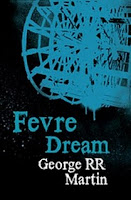Fevre Dream is very intentionally a novel of two parts, to the point where I'm not entirely sure why Martin didn't make the split more explicit. Having said that, I think doing so would have made the main problem with the novel all the more explicit: the break in the action robs the story of almost all of its forward momentum. The narrative manages to claw itself back into full gear, but only just - pretty much the very instant we're back at full speed, the main story ends, and we're left with only a brief epilogue to round things off.
Which is a real shame, because for most of its run, the book is very good indeed. As is common with Martin, the narrative is third-person limited; our windows into the story are Abner Marsh - a spectacularly ugly but formidable steamboat captain, and Sour Billy Tipton - a depraved slave master with eyes on rising above his station. Abner is a nice creation, dogged loyalty and grim determination warring constantly with a volatile temper and knuckle-dragging masculinity. Sour Billy is somewhat less interesting, a fairly standard sadistic bastard, but his observations are critical to the novel, and are interesting enough in their own right.
It's the basic theme that's the real winner here. Using the unthinking, endless erosion of the Mississippi River as a metaphor for the immortal power of vampires is an inspired idea. The river itself is constant, but by gouging out new channels as it erodes it surroundings, it ends up changing itself. The same is true of Martin's vampires - they cannot change themselves, but by the gradual accumulation of their actions, they find themselves changed from without, and not simply because mankind is desperate to kill them whenever possible.
Contrasted with this are humans like Abner. Their surfaces are as changeable as that of the Ohio - calm or turbulent, pale or cloudy or dangerously dark, or even frozen entirely, but underneath it all, they are the same river. Part of the point of the arresting stop partway through the book seems to be an attempt to drive this home as explicitly as possible, which is a shame, because it was working exceptionally well as subtext, and isn't well-served by the sledge-hammer approach.
That gripe aside, however (I'd say this issue reduces the book from a four and a half star work to one that just scrapes four stars), the constant intertwining of stasis and change provides the perfect backdrop for what is, at heart, perhaps not the most original vampire tale one could imagine, and combined with the vivid atmosphere provided by the moonlit river and by Martin's descriptive skill, it's a story well worth reading. Especially since the ending, if rushed, is solidly built, both surprising upon initial encounter and completely obvious upon reflection. Martin has proven already with A Song of Ice and Fire that he's more than capable of seeding sufficient clues into a tale to make the reader slap themselves when they finally figure out what's going on, and Fevre Dream pulls off the same trick.
Plus, it's a full-length Martin story that has actually ended. That's worth celebrating in itself.

No comments:
Post a Comment